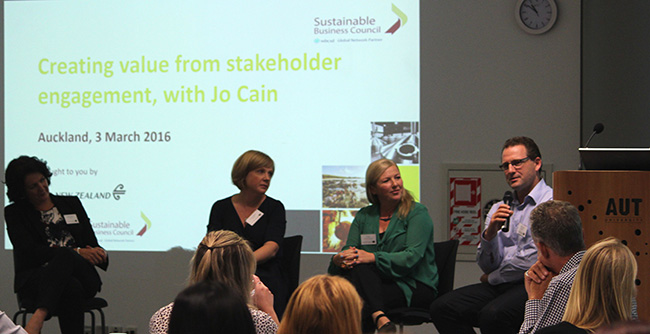Materiality counts in New Zealand
A leading reporting expert from Australia says there’s growing momentum among New Zealand companies to work out what their material issues are – that is, the most important issues for their business and a wide range of stakeholders.

A leading reporting expert from Australia says there’s growing momentum among New Zealand companies to work out what their material issues are – that is, the most important issues for their business and a wide range of stakeholders.
Jo Cain, Executive Director of Materiality Counts, has worked with a number of ASX and NZX listed companies on their sustainability, integrated and annual reports and serves on a number of Boards, including the Australian Auditing and Assurance Standards Board (AUASB).
She spoke to about a hundred people this week at workshops in Auckland and Wellington hosted by the Sustainable Business Council. She worked through how to get value from improving understanding of material issues and engaging with a range of stakeholders,including shareholders, investors, customers, suppliers, community members,employees, government, interest groups and more.
Materiality is different for every business. It almost always encompasses financial, social, environmental and governance-related risks and opportunities. Jo said:
“Some material issues cut across most New Zealand businesses. They are things like profitability, customer satisfaction and employee engagement and retention. But elsewhere they differ: for example, for a food company, food safety and quality is likely to be material, while for a bank, responsible lending and data security feature prominently.
“Most executives have a fair idea what the issues are that could have a material impact on their business – it is what keeps them awake at night. What takes it to the next level is understanding what the people who interact with your business think are your most pressing issues and then balancing the two.
“The results can be surprising and they often help businesses open their eyes to issues they hadn’t considered before or identify issues on the horizon that need more work. It puts them in a much stronger position to manage those issues.”
A report released by EY called Materiality and sustainability disclosure – Key insights from the ASX100 showed that by early 2015, half of all ASX top 100 companies provided some evidence of a process to identify their material sustainability aspects.
“While more Australian businesses are measuring and reporting on their material sustainability issues, I’m seeing areal openness and some innovative thinking among New Zealand companies on engaging with their stakeholders. In my view, that will be a real advantage here.”
Contact:
Phone:
Email:
